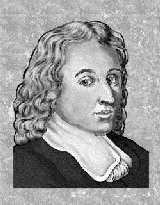
Born: June 19, 1623, in Clermont-Ferrand, France
Died: August 19, 1662, in Port Royal or Paris, France
Blaise Pascal was a French philosopher, scientist and mathematician whose extraordinary theories and inventions still prevail today. He pioneered probability theory, was a philosopher and laid the foundations of hydrodynamics.
Pascal received most of his education from his father. When he was quite young, the family was temporarily forced into exile when his father had a disagreement with the cardinal. The cardinal eventually relented, however, and they were able to return.
In 1646, Pascal's family became involved in the religious teachings of Jansenism, a sect of Roman Catholicism, but Pascal was too preoccupied with science to pay much attention to religion. At the age of seventeen, he had attracted the attention of the famous mathematician, Descartes, with a treatise he had written on geometry. And when he was nineteen, he invented the first mechanical adding machine to assist his father in his work.
In 1650, the family returned to Paris. A year later Pascal's father died and about the same time, his sister entered the convent at Port Royal. It is at this time that Pascal, turned his hand to writing an essay on the subject of love. Several years later, Pascal returned to the Jansenist community and is believed to have had a mystical experience. At this time, he abandoned his scientific research and concentrated more on attempting to discover the mysteries of faith, religion and the application of science. He remained with the Jansenists, cut off from much of the outside world until his death.
After his death, the Jansenists collected his manuscripts and edited them. They published the work under the name Pensées. The fragments of text provide insight into Pascal's views on religion and are a testament to his faith.
His contributions to science are considerable, including the advancement of methodology and empirical experimentation, the invention of the syringe and hydraulic press, the development of probability theory and hydrodynamics, and a greater understanding of atmospheric pressure.